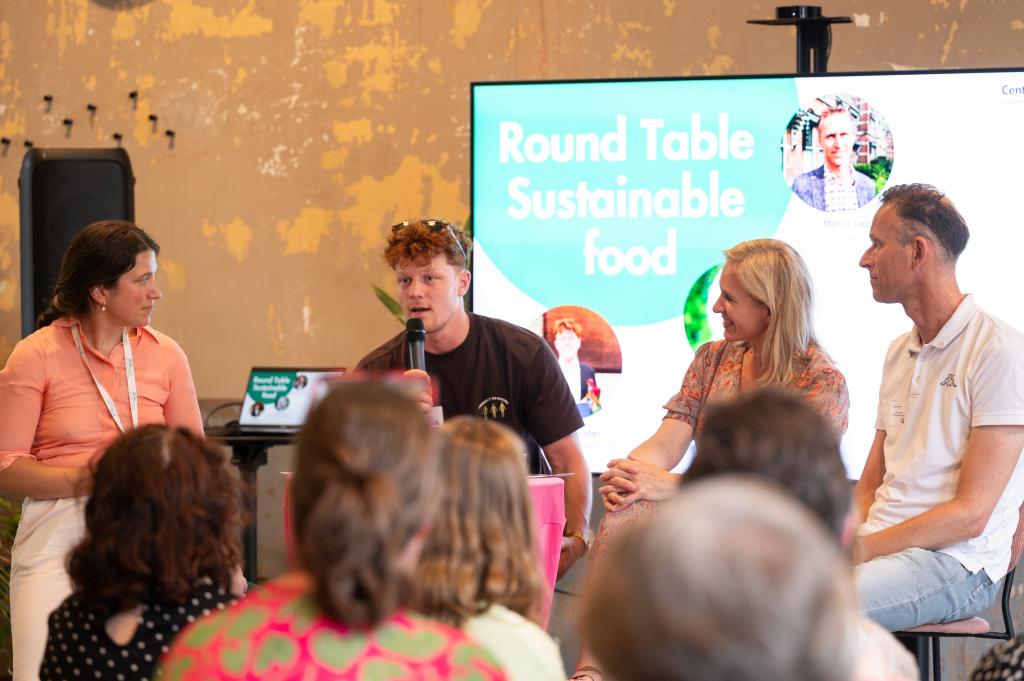About the Thesis Labs
In a Thesis Lab, master's students from the Leiden-Delft-Erasmus universities and from HBO programs in South Holland collaborate with companies, institutions, governments, and citizen initiatives on an urgent, sustainable challenge. This includes projects in green healthcare, sustainable aviation, circular horticulture, or equitable, sustainable spatial planning. A Thesis Lab builds bridges between disciplines. Students learn from each other's specialties and methods..
Read more
"HBO and university students learn a lot from each other," says Jenny Coenen. "One of our HBO students participated in the Thesis Lab Circulaerospace. Mostly university students took part. They often have more time for their research. More time to ‘wander,’ explore the topic, and work on a theoretical context. HBO students work much more in a question- and user-oriented manner. ‘What needs to be done?’ And then they get to work right away. Because there’s pressure, they also make mistakes. And that's okay. In fact, it’s necessary because that’s how you learn. Thanks to the Thesis Lab, my student gained a deeper understanding of research skills. The university students were able to see how to work smoothly in co-creation with companies, how to ask for feedback, and then move forward with it."
"A mix of programs creates an exciting dynamic," Jelle Joustra also observes. "HBO has different programs than the university, with a different focus. When you bring all those students from various fields together around one major challenge, sharp discussions arise. We see that happening in the Thesis Labs. Everyone has a different perspective on the topic. This triggers critical questions, towards each other but also towards the company that posed the question for the Lab. In this way, students develop an open attitude. They learn not to be afraid and to speak up. But also to challenge their own ideas. We need people like this to solve the complex challenges in the field of sustainability."
"Students also complement each other practically," says Coenen. "In the Re/manufacturing Lab of the University of Applied Sciences, we work on solutions to automate the disassembly of items like an electric motor. The workstations, such as a robot or scan station, are built by HBO students themselves. Now we need someone to create a simulation model of the entire factory. That’s suits a university student better, someone who can create scenarios and work with many different assumptions at the same time. That could really advance the Lab. I think we at HBO should more easily just pick up the phone and call our neighbors at TU Delft to find such a student. I don’t actually do that enough myself."
"Experiencing practice firsthand raises new scientific questions," Joustra has experienced. "The Hague University of Applied Sciences gave us a tour of the Re/manufacturing Lab. For us, coming from a scientific background, it was a different world. We saw all kinds of hands-on solutions for the industry, different types of experiments than those we do at the university. Like how you disassemble certain valves or components with robots, for example. You don’t come across that type of task with us. With these kinds of experiments, you encounter entirely different questions. You come across things you want to know but can’t find written down anywhere. For instance, questions about the interaction between humans and robots. That tour in the Re-manufacturing Lab was a wonderful mirror and gave us many new insights. And questions."
"Collaboration between HBO and university students is easier than you think," Joustra believes. "For me, it doesn’t matter whether someone has an HBO or university background. The graduation process is very much the same. Even in the Thesis Lab, students follow the same steps. They discover, for instance, how to collaborate best with the company that posed the research question. What data does the company want to share? What research facilities can you use? And very importantly: students must formulate their own research question. In the Thesis Lab, with students from other programs, they experience that their framework is limited. Others may be working on the same topic but approach the issue completely differently. That helps you refine your own research question. And engage in conversation with the company. The company then gets extra critical reflection moments. Companies really appreciate that."
"A great collaboration can be found in small things," Coenen discovered. Not only in education, but also in research, there’s much to be gained. "So don’t say ‘no’ too quickly to a colleague institution. Colleagues from the Center for Environmental Sciences in Leiden called us because they had heard that we collect and disassemble ‘old junk’ with students, such as electric toothbrushes and toasters. We try to determine the residual value of those products and collect all kinds of data on disassembly. This can help companies start working on extending the lifespan of products, for example, by repairing them. The Center for Environmental Sciences in Leiden was interested. They are working on a project that aims to make eco-impact assessment easier and were looking for initiatives where citizens (co-)participate in scientific projects involving disassembly. Now we’re looking at how we, from The Hague University of Applied Sciences, can contribute to this. It's great how we complement each other in this way."

